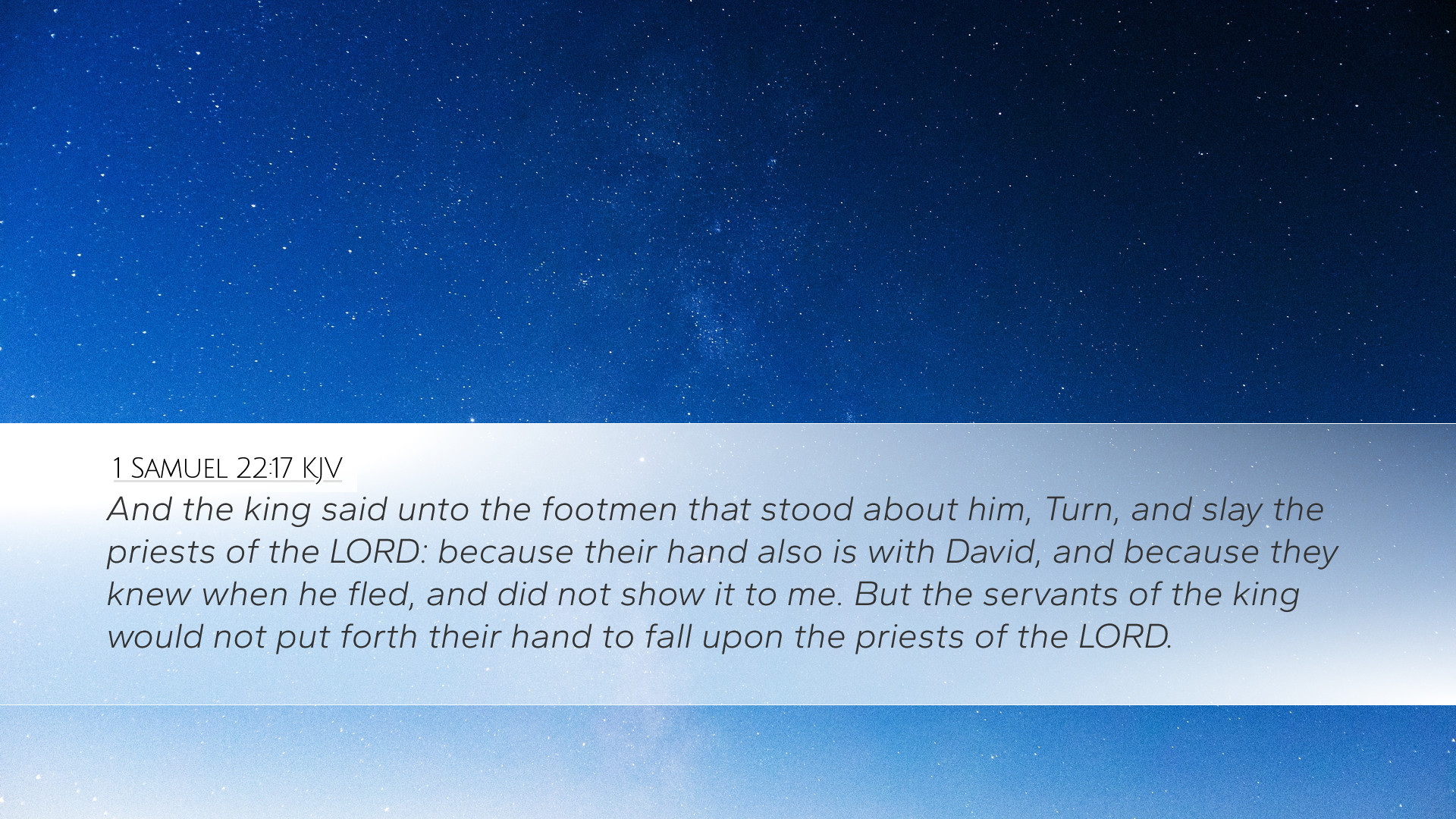Commentary on 1 Samuel 22:17
Verse Text: "And the king said to the footmen that stood about him, Turn, and slay the priests of the LORD; because their hand also is with David, and because they knew when he fled, and did not show it to me." - 1 Samuel 22:17 (KJV)
Introduction
This verse marks a significant and tragic moment in the narrative of Saul's reign over Israel. It reveals the depths of Saul's paranoia and the lengths to which he would go to eliminate perceived threats to his authority. The command to slay the priests indicates Saul's complete moral corruption and disregard for the sanctity of the priesthood. This commentary seeks to unpack the implications of this action and analyze the theological implications from various public domain commentaries.
Contextual Background
In the previous chapters, David has become a fugitive, pursued by Saul who is increasingly consumed with jealousy. The priests of Nob, led by Ahimelech, provided David with sustenance and Goliath's sword, unbeknownst to Saul. This act of assistance triggers Saul's wrath, leading him to view the priests as complicit with David.
Saul's Command Explained
Matthew Henry emphasizes Saul's irrationality and cruelty, highlighting the fact that he unjustly punishes the innocent while wrongly concluding that the priests were in league with David. Saul’s order to kill the priests not only violates the sacred responsibility of his kingship but also reflects his deep-seated insecurity and moral decline.
Henry's Analysis:
- Persecution of the Innocent: Henry notes that the priests had no intention of rebel against Saul. Their only crime was aiding David, which was misconstrued as treachery.
- Blind Ambition: Saul’s command demonstrates the destructive power of ambition unchecked by moral principles, leading him to eradicate those who remain faithful to God’s anointed.
Albert Barnes' Commentary
Albert Barnes adds a critical historical dimension to the text. He views Saul's actions as a fulfillment of the prophetic word that God had previously spoken about the downfall of Saul's kingdom (1 Samuel 15). Barnes underscores that Saul would go to great lengths to maintain his power, even to the point of murder.
Barnes' Observations:
- The Tragedy of Misplaced Trust: Barnes points out that the priests’ failure to report David stems not from disloyalty but from their trust in God's deliverance, which illustrates the complexities of faith in a hostile environment.
- The Severity of Saul's Judgment: Saul's intention to slay priests reflects a tyrannical spirit, showcasing how fear can lead leaders to extreme measures against perceived threats.
Adam Clarke's Exegesis
Adam Clarke's work is noted for its depth of linguistic and cultural analysis. He highlights the terminology used in the Hebrew text and its implications. The term "footmen" signifies those who were most loyal to Saul but also reflects the base nature of his enforcers, considered unworthy of such a heinous act.
Clarke's Insights:
- Character of the Executioners: Clarke recognizes the irony that those who carried out Saul's bloody command were not of noble character, raising questions about the moral fabric of society under such a ruler.
- Spiritual Consequences: Clarke warns of the spiritual ramifications for Saul, noting that his actions are contrary to God’s laws, likely provoking further divine judgment.
Theological Implications
The horrific command to slay the priests reveals several key theological truths that resonate throughout the Bible. First, it highlights the sanctity of life and the dangerous consequences of placing personal ambition above divine statutes. All three commentators agree that this act is not just a political maneuver; it is an abomination against God’s will and order.
Lessons for Today:
- Integrity in Leadership: Those in leadership are called to act with justice and mercy, not allowing fear to dictate their actions.
- Faithfulness Under Persecution: The priests’ plight is a reminder of the prophetic call to stand for righteousness even when it leads to personal risk.
- The Nature of Authority: True authority must reflect God’s character—Saul's failure exemplifies the consequences of power without accountability.
Conclusion
1 Samuel 22:17 is a sobering reminder of the brutality that can arise in the vacuum of godly leadership. The insights from Henry, Barnes, and Clarke provide a comprehensive understanding of the spiritual and moral failures manifested in Saul’s command. This passage serves not only as a historical account but also as a cautionary tale about the responsibilities borne by those who lead in faith.


